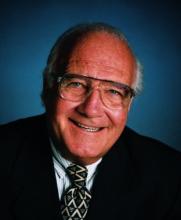Dr. Paul J. Fink, a longtime Clinical Psychiatry News columnist and editorial adviser, and leader in the field of psychiatry, died June 4. He was 80.
Dr. Fink, a psychotherapist, psychiatry professor, and speaker, was a fierce advocate for his beloved specialty. "I have been an activist most of my life," he wrote. "Part of my role and that of other physicians is to help those less fortunate."
He took that role seriously. For example, he worked to prevent child abuse and to promote the treatment of trauma. He was a true believer in the findings of the Adverse Childhood Experiences Study, which showed that life experiences such as childhood maltreatment are major risk factors for the leading causes of death and illness in the United States. He called this study "the most important proof of the validity of one of the major building blocks of psychoanalysis."
In recent years, Dr. Fink advocated on behalf of men serving life sentences at the State Correctional Institution at Graterford, Pa., a maximum security prison. "Some psychiatrists fail to speak up because they are afraid that their visibility will scare patients away," he wrote. "But being only concerned with self allows ... injustices to continue."
Many of his writings – and much of his work – focused on the need to change the language to make it less stigmatizing toward people with mental illness. "Patients need to be referred to as people with schizophrenia rather than schizophrenics," he wrote. "It is wrong to identify the patient as the disease. Rarely, if ever, would we refer to a person as a ‘coronary’ or an ‘appendix.’ "
When Dr. Fink served as president of the American Psychiatric Association, he chose the defeat of stigma as his theme. Just last year, he said that of the hundreds of articles he wrote over the years, the one he valued most was based on a talk delivered at an American College of Psychiatrists meeting called "The enigma of stigma" (Psychiatr. Ann. 1983;669-90).
In addition to his clinical and volunteer work, Dr. Fink was a professor of psychiatry at Temple University in Philadelphia. Among other activities, Dr. Fink was a member of the Leadership Council on Child Abuse & Interpersonal Violence, a founding member of the Philadelphia Youth Violence Reduction Partnership Program, and chairman of the city’s Youth Homicide Committee. He chaired three departments of psychiatry in his career and received numerous awards, including the APA/National Institute of Mental Health Vestermark Psychiatry Educator Award and the Francis J. Braceland Award for Public Service.
As his 80th birthday approached last year, Dr. Fink pondered how he wanted to be remembered. "At this point, I am asking myself: Should I focus on putting my affairs in order? Or should I keep plugging along and continue fighting against stigma on behalf of people with mental illness so that my kids will be able to say with pride: ‘He was my Dad.’
"I think I’ll do both."
When members of the editorial advisory board learned of Dr. Fink’s death, we received several testimonials. Among them:
• Dr. Lee H. Beecher: Since 1991 when I joined the board, I saw Dr. Paul Fink as our Thought Leader. His CPN column and commentaries are timely insights into both psychiatry’s clinical challenges and recommendations for social policy. Always embracing a biopsychosocial perspective, Dr. Fink by his experience and example successfully challenged psychiatrists to provide both leadership in evaluating emerging systems of health care and excellence in doing patient care. I will miss Paul’s energy, passion, exuberance, honesty, and penetrating inquiry. We owe Dr. Fink a great deal for his valuable service to our profession!
• Dr. Steven R. Daviss: I’m so sorry to hear of Dr. Fink’s passing. A giant in psychiatry, he will be greatly missed.
• Dr. Rodrigo A. Muñoz: Paul and I had a great personal relationship for longer than 30 years and were partners in many APA struggles. The ones I remember the most: Paul was one of the first in the APA to recognize that our organization was changing rapidly. Paul led for many years the fight against discrimination. Paul was a champion in the fight for the integrity and the science of psychiatry. Paul believed to the end that the strength of the organization was in its members, and fought some of his best battles to protect the members and their work.
A memorial service will be held for Dr. Fink on Monday, June 16, at 1 p.m. at the College of Physicians of Philadelphia.


